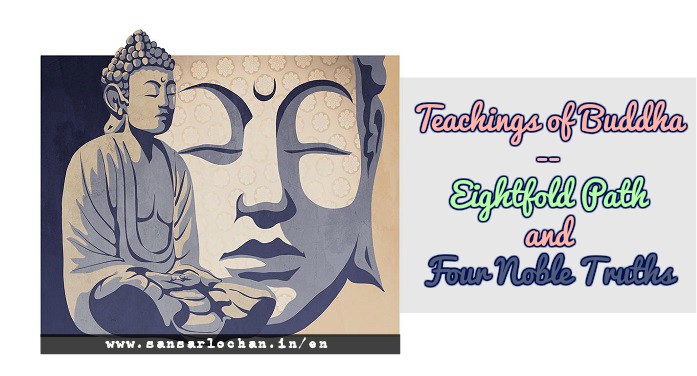The teachings of the Buddha like his Eightfold Path and Four Noble Truths were essentially simple and of a practical nature. He did not concern himself with the problems of God or the Soul, as he believed such discussions were of no help in one’s moral progress. He declared that everything was transitory or impermanent. Like other teachers of his day, he regarded existence as an evil, but he was far more deeply stirred by the grim reality of sorrow and suffering. He, therefore, mainly addressed himself to analyzing its cause and finding out a way leading to its cessation. These were the Four Noble Truths, which he proclaimed with all his earnestness were:-
Four Noble Truths
- Sorrow (dukkha)
- Cause of Sorrow (dukkha-samuchhaya)
- Cessation of Sorrow (dukkha-nirodha)
- The path leading to the cessation of Sorrow (dukkha-nirodhagamini-pratipad)
According to him, the root of all human misery was “desire” (tanha), and its annihilation was the surest means of ending unhappiness. He held that death was no escape from it, as it led to rebirth and further suffering. The suppression of “thirst” was possible if people followed the noble Eightfold plan. Those Eightfold plan of Buddha were :-
Eightfold Plan
- Right belief
- Right thought
- Right speech
- Right action
- Right means of livelihood
- Right endeavor
- Right recollection
- Right mediation
The Buddha called it the Middle Path as it avoided both the extremes of gross luxury and grim austerity. Even those who were unable to retire from the concerns of life could obtain success by following it. The members of Nibbana or Nirvana, or “extinction of personality”. They were exhorted to be strictly pure in thought, word and deed. As an aid to this, he laid down ten commandments, of which the first five were to be observed by the laity as well.
Ten Commandments of Buddhism
- Not to covet others’ property
- Not to kill
- Not to use intoxicants
- Not to tell lies
- Not to commit adultery
- Not to take part in singing and dancing
- Not to use unguents, flowers or perfumes
- Not to eat at odd hours
- Not to sleep on comfortable beds
- Not to accept or keep money
The Gautam Buddha thus prescribed a severely practical code of conduct for his disciples. He discouraged philosophic speculation considering it unprofitable for one’s spiritual advance. What was still more important in his healing declaration that all could partake of his message, irrespective of sex, age or position in society.
Do read about : The Story behind Siddhartha Gautama becoming Buddha
